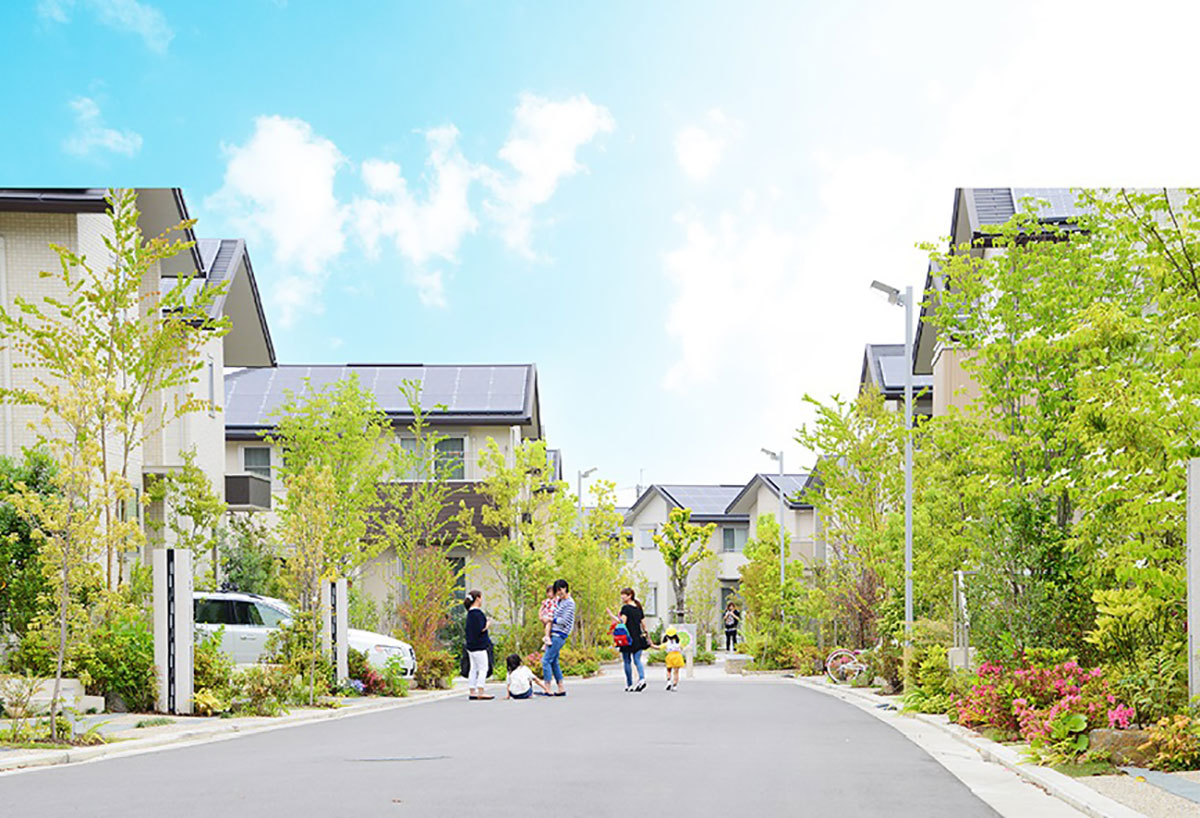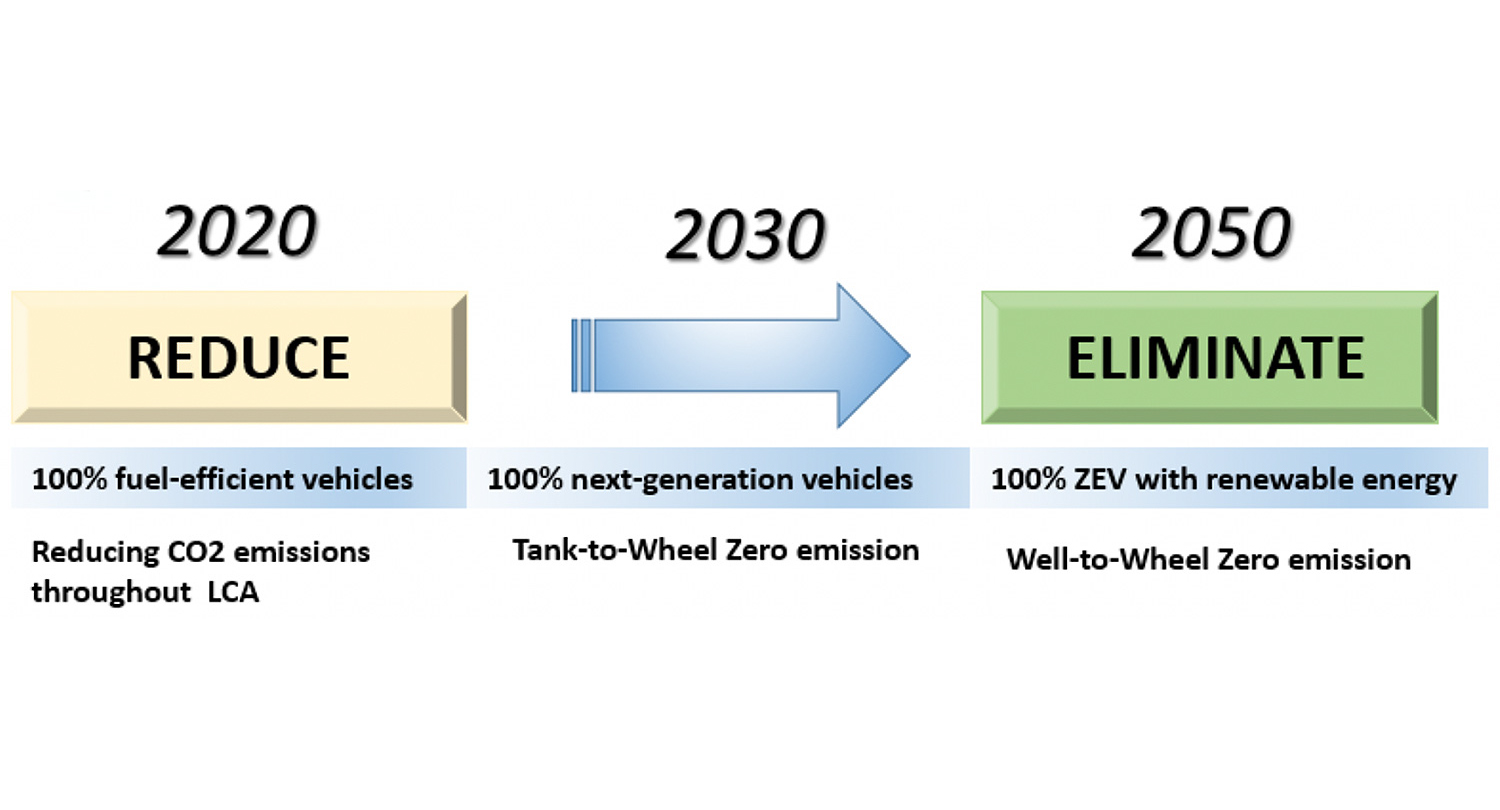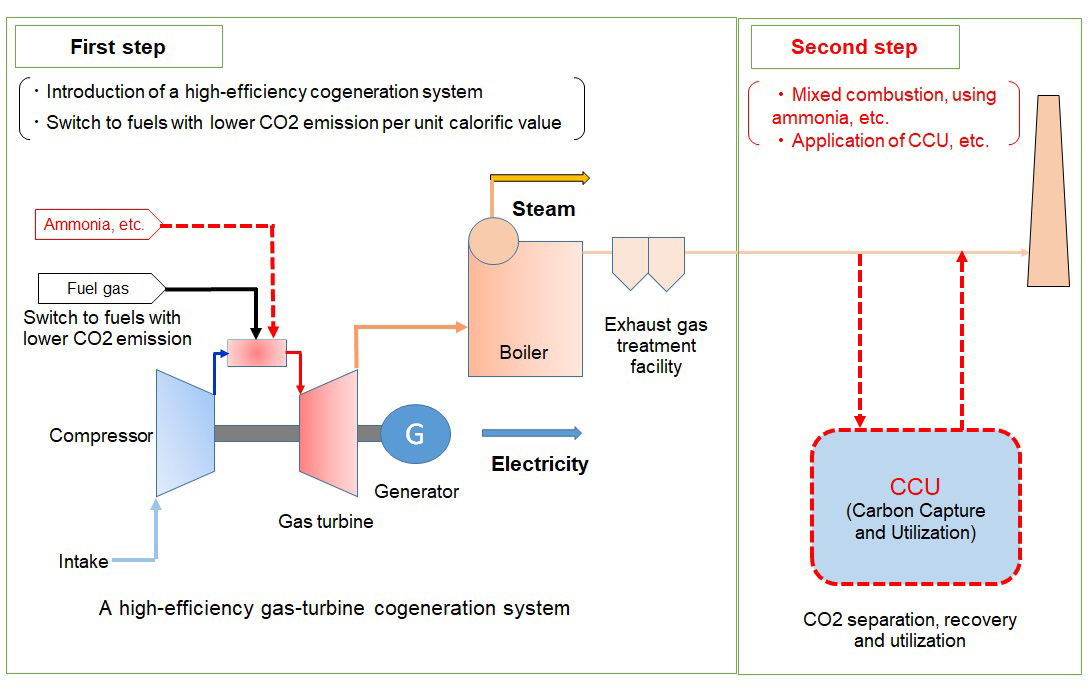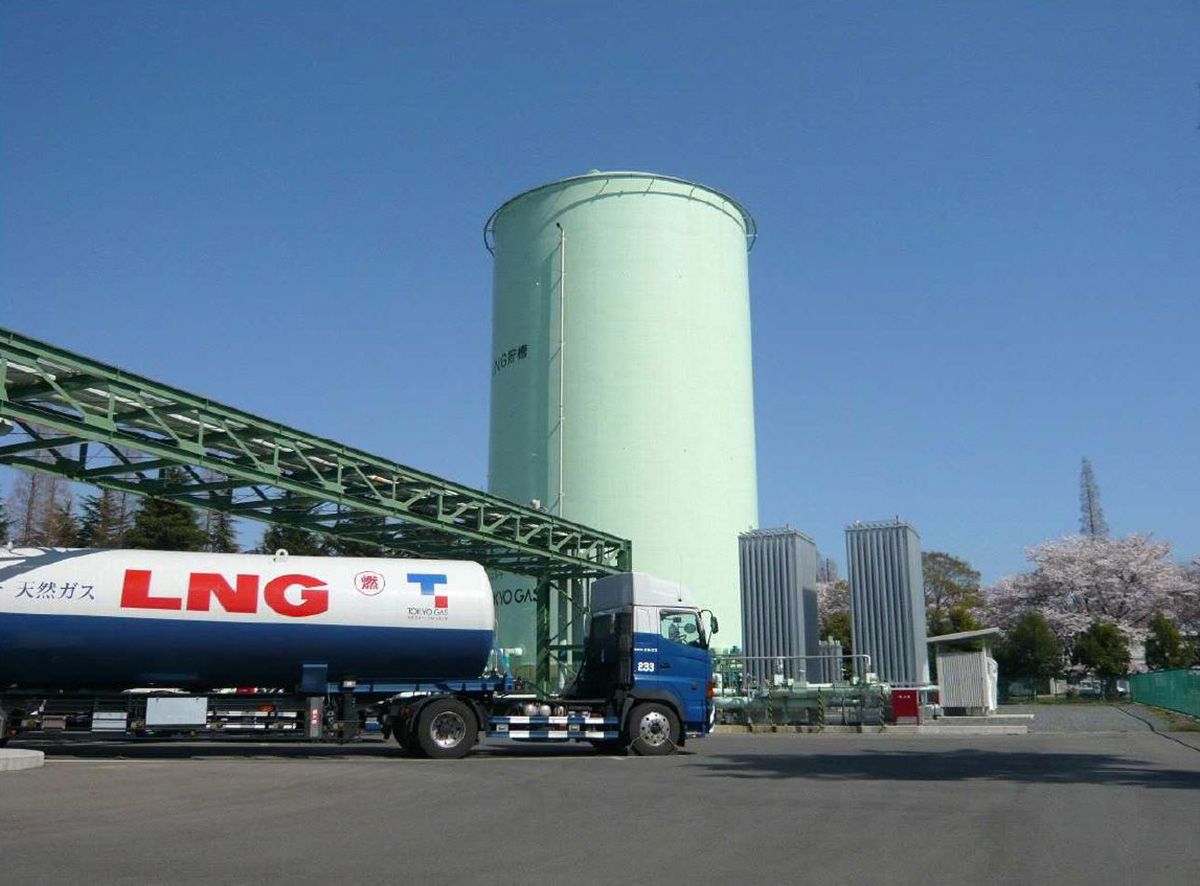Achieving net-zero emissions by promoting renewable energy use through both our monozukuri and products.
DAIWA HOUSE INDUSTRY CO., LTD.
Outline
We aim to promote renewable energy use and achieve net-zero emissions through both our monozukuri* and “products and services”. In monozukuri, we will further promote energy saving in existing facilities and increase the use of renewable energy. Our targets include increasing the ratio of renewable energy-based power generation (including sale of electricity) as compared to the Groupwide electricity use to 100% by 2030, and, fully cover it with renewable energy by 2040. Regarding “products and services”, through promoting net-zero-energy houses (ZEHs), net-zero-energy buildings (ZEBs) and net-zero-energy towns (ZETs), we will work on the development of towns that use renewable energy as their single source of electricity.
*Monozukuri is a Japanese term that means business and activities to build, manufacture and develop products.
Description
・Targets of our endeavors (development, implementation, cost, popularity, etc.)
In fiscal 2016, the Daiwa House Group formulated “Challenge ZERO 2055,” its long-term environmental vision toward 2055, the 100th anniversary of the foundation of the Group. As a “Group that co-creates value for individuals, communities and people’s lifestyles,” as our Management Vision states, our aim is to realize a sustainable society. Setting “slowing and adapting to climate change” as one of the top-priority themes, we take on the challenge of achieving zero environmental impact. To enhance the effectiveness of our efforts, we joined EP100 and RE100, international initiatives to promote energy efficiency and renewable energy use, respectively. In addition, we acquired the certification for SBT (Science Based Targets), an international initiative for reducing greenhouse gas emissions. Thus, we are the world’s first company in the construction and housing industry to join all of these three initiatives.
Challenge ZERO 2055 – Slowing and adapting to climate change
Challenge: We aim for zero CO2 emissions throughout the product life cycle through uncompromising pursuit of energy saving and utilization of renewable energy in order to achieve a carbon-free society.
Action 1 (Products): By achieving average ZEH and ZEB for new houses and buildings (by 2025 for single-family houses, by 2030 for buildings), we aim to reduce greenhouse gas emissions (per area) from houses and buildings in use by 30% by 2030 from the fiscal 2015 levels. At the same time, we are going to promote the construction of zero energy towns through renewable energy-based power generation and low-carbon electricity supply. [SBT]
Action 2 (Monozukuri): We aim to reduce greenhouse gas emissions in all facilities and all business processes (per sales unit) by 45% by 2030 and by 70% by 2055 from the fiscal 2015 levels. [SBT]
・ By further promoting energy saving for existing facilities and achieving ZEB for facilities to be newly constructed, we aim to increase the Groupwide energy efficiency (sales unit per consumed energy) by half by 2030 and double it by 2040 from the fiscal 2015 levels. [EP100]
・ We aim to expand renewable energy and raise the ratio of renewable energy-based power generation (including sales of electricity) to the Groupwide use of electricity up to 100% by 2030 and fully cover it with renewable energy by 2040. [RE100]
Action 3 (Monozukuri and procurement): We aim to decarbonize our supply chain, in the process of the initiatives we are taking jointly with 90% of our main suppliers, by sharing the Paris Agreement-based greenhouse gas emissions reduction target by 2025. [SBT]
Backcasting from the long-term environmental goals, we have set milestones between 2025 and 2030. In accordance with our medium-term management plan, we have formulated concrete targets and plans called an Endless Green Program (EGP) for nearly every three years. Currently, the Endless Green Program (EGP) 2021 is being implemented as an action plan from 2019 to 2021.
In monozukuri, we cooperate with our business partners and help our principal business partners set goals for reducing greenhouse gas emissions. Our target is to have 90% or more of our principal business partners set targets for greenhouse emissions reduction by fiscal 2021. Another target is to reduce the greenhouse gas emissions (per unit of sales) for all facilities and business processes by 35% by fiscal 2021 as compared to the base year, fiscal 2015; our group has been accredited by SBT for this. Other targets we aim to achieve by fiscal 2021 include improving energy efficiency (sales per energy consumption) 1.4 times higher than that in the base year, fiscal 2015; increasing renewable energy usage rate to 3%; and the renewable energy rate (including sale of electricity) to 85%.
In “products and services”, we aim to increase sales from environmental contribution businesses, such as renewable energy power generation and sales from ZEHs and ZEBs, to 1.5 trillion yen by fiscal 2021. In addition, by fiscal 2021, we aim to reduce the greenhouse gas emissions (per area) derived from the use of products by 6% as compared to fiscal 2015 and achieve a ZEH sales rate of 60% and ZEB sales rate of 30%.
・ Issues to be resolved to achieve the challenge
The major issues are the government’s policy (on expanding renewable energy sources), cost (continuation of subsidies), and the raising of environmental awareness in the business and household sectors.
・ Specific actions taken
In monozukuri, we have been conducting questionnaire surveys of our principal suppliers since fiscal 2017 to check their greenhouse emission reduction targets, implementation results, and achieved numerical figures. In fiscal 2018, a survey of 250 principal suppliers showed that 54% had set targets for greenhouse emission reduction. (The figure covers the suppliers of Daiwa House Industry Co., Ltd., Daiwa Lease Co., Ltd. and Fujita Corporation.) Through our efforts to promote our mega photovolatic power business, the share of renewable energy sources in the Group’s purchased power increased to 88% in fiscal 2018.
In “products and services”, we started a project in 2010 to develop energy-self-sufficient ZEHs, even before the Paris Agreement. In 2011, we started selling houses equipped with external heat insulating walls (xevo), photovolatic power, lithium ion storage battery and home energy management system (HEMS). In October 2018, we introduced xevo Ʃ Premium, which has achieves one of the highest insulation levels in the industry, as it satisfies the ZEH standards even with open-air portions (such as windows) that are 1.6 times larger than those of the existing models. In March 2019, we released new anti-disaster houses that adapt to climate changes, equipped with an all-weather system linked with three kinds of batteries that can supply electricity, heating and hot water for about 10 days even when in rainy weathers. In the field of commercial and business facilities, we began the sale of the D’s SMART Series, whose concept is to use energy wisely with cutting-edge technology. In February 2018, we constructed in Saga Prefecture the first office building in Japan self-powered with renewable energy by combining photovolatic power and large lithium ion storage batteries. Through these projects, we are accelerating our efforts in the commercial and business facilities segment. In town development, we built the first net-zero-energy town in Sakai City, Osaka Prefecture, in 2013. Utilizing our Group-wide resources and technologies, we are also developing complex smart cities. In addition, we also focus on environmental energy business to promote renewable energy use, including renewable energy power generation from wind, photovolatic, and hydraulic power sources as well as retail of electricity generated solely from renewable sources.
・ Quantitative effects, etc. from achieving the challenge
By providing energy-efficient and comfortable living, we will contribute to the reduction of greenhouse gas emissions in business and housing sectors, whose emission levels tend to be increasing.
Supplementary information
Daiwa House Group Environmental Efforts
https://www.daiwahouse.com/English/sustainable/eco/
Long-term environment vision: Challenge ZERO 2055
https://www.daiwahouse.com/English/sustainable/eco/vision/
Environmental Acton Plan “Endless Green Program 2021"
https://www.daiwahouse.com/English/sustainable/eco/egp/
Daiwa House Group Sustainability Report 2019
https://www.daiwahouse.com/English/sustainable/csr/esg/csr_report/
Similar Innovation Challenges
Achieve 2050 decarbonization target with Net Zero Energy House!
Sekisui House, Ltd.





